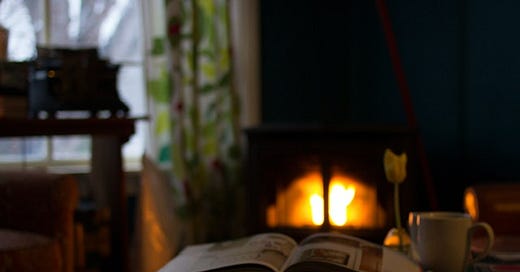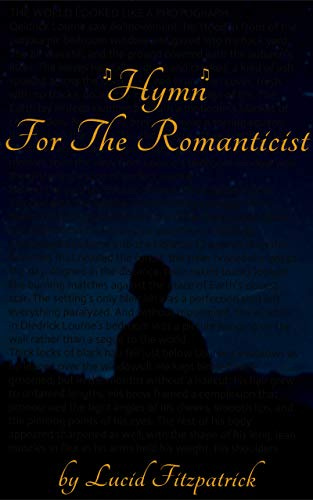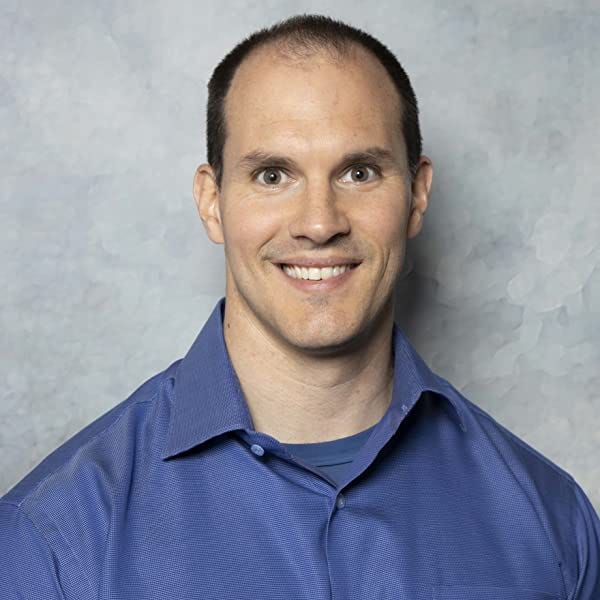“Lucid as in…..expressed clearly; easy to understand.”
My last conversation with Lucid Fitzpatrick, author of the novelettes “d’Anima” and “Hymn For The Romanticist” was on February 22, 2020, just as the Covid-19 pandemic was beginning its steady rise. Residing in the Chicago area, my adopted hometown, Lucid and I began our most recent about the changing weather pattern in the Windy City.
“About the fall weather, well it’s starting to get a little cooler outside,” he says with a wry chuckle and nods toward the infamous Chicago winters affectionately known as “The Hawk”.
We then launched into a discussion about the Wim Hof Method, a cold exposure health and wellness regimen that we have a shared interest in. Lucid proceeds to tell me that because the temperature had dropped to 40 degrees this morning, he was elated to have been able to do his cold exposure routine outside this morning.
“I went outside in shorts and a cutoff t-shirt and sat outside for 15 minutes listening to some comedy.”
Curious, I asked him what that experience was like. He responds,
“Ice baths are way harder. I sat out and discovered that this is not hard at all. But ask me again in January and maybe I’ll have a different story.”
At this point, he launched into a brief soliloquy about the thermodynamics of water and “how it’s different from air. And the fact that it’s so harsh getting into the water and experiencing a slow burn, or slow cool down and…”
I then proceed to interrupt him with my own cold exposure experience that morning fueling a minute or so of macho back and forth
Me: “Yeah, well, I took a cold shower this morning. So, I’m up to maybe a maximum of four minutes.”
Lucid: I can sit in an ice bath pretty well.
Me: “Yeah?”
Lucid: “The shower’s harder.”
Me: “Is it?”
Lucid: “Yes, because the water’s hitting you and moving. It makes it difficult to get settled.
After pontificating for a bit on the merits of The Wim Hof Method, I asked Lucid for an update on what has been occurring in his life since we last talked amid the pandemic taking shape. He offered this:
“Personally, I’m over it. I’m trying to live my life as much as I can. And I hate the word ‘before times’ that I hear talked about often in social media. I try to live my life as if it doesn’t exist as much as I can, which is hard. And I try to put myself in positions where I don’t have to think about it or deal with it, right? So, whenever I have a chance to do things in an outdoor setting or something along those lines, so that I don’t have to think about having a mask coming, that's the route I take. I try to put myself in situations where I’m around people I know who are of the same mindset. But I have to say that it was tough navigating this for a long time.”
Lucid says that the pandemic was a catalyst for him to write:
“I had a few stories in the mix for sure. The first one I published was called “Hymn for the Romanticist.” In addition, there were a few other interrelated stories that happened in and around that time as well.”
Reflecting further, he had this to say:
“The inability to go out to eat, do anything recreationally, socialize with people outside of your bubble, I found that to be very exhausting. It takes a lot of energy to live like that. So that was the catalyst and theme for the ‘Hymn for the Romanticist’ my most recent short storybook.”
The story, says Lucid, is about a creative mind who is experiencing the pandemic as a writer. He struggles with not being able to go to the coffeehouse he regularly frequents. In addition, the independent bookstore where he sold his first book is closed down. He tries to navigate all of this and stay energized amid life under the lockdown. Unfortunately, he ultimately reaches a point where he becomes completely paralyzed and unable to do the massively creative work he’s called to.
Says Lucid:
“Writing this book was a reflection of my own personal experiences in romanticizing what was happening throughout the pandemic, specifically what I was feeling and the things I was discovering along the way to get me through.”
He recalls listening to music, particularly of the classical variety, going for long walks, and practicing meditation all in the hopes of continuing to energize himself and the chaos.
“With how everything shut down, it was so exhausting. Kinda funny how inertia works that way. It required a great expenditure of energy to get things moving with things that were very simple before the pandemic started. So all that came a part of that story as I developed it.”
Because writing is already a very solitary lifestyle, he reasoned that authoring this book would be no big deal. He thought for sure he’d be more productive because as he put it, “there would be fewer distractions.” But he didn’t find that to be the case at all, a point that is reflected in the book’s main character.
“I do live close to a lot of family. Some of my extended family and my wife’s direct family. So we just made the decision that we’re just going to be around each other and try to get through this pandemic together. Friends, on the other hand, were a little bit more complicated because they’ve got their own risk factors and decisions. But we eventually decided to see each other as well and hang out provided that none of us feel sick.”
Lucid says that this was helpful because “at least you do have people outside of your own house that you can talk to.” He continues:
“My wife and I have young kids so we wanted to make sure, especially as they’re growing, that their formative relationships remain in place as much as possible. We made that decision early on and it proved to be one of the things that helped us kind of get through it all. But still, I mean, there were so many more things that were happening in the world that still made it really hard despite having some glimmers of light as we navigated through all of this.”
Lucid and I also discussed the pervasiveness of fear that has been a common narrative amid Covid’s unpredictable nature.
“This fear has, for a certain percentage of the population, made it frightening to go back to work or even reengage back into the world. There have been a ton of consequences that have ensued from that both interpersonally and obviously, economically. Even today, a certain percentage of people haven’t gone back, either choosing not to because they’ve got some financial security or they’re simply just too afraid to go back to work. All that’s gonna have production consequences.”
All of this, he says, reflects a key issue that the world is now encountering in a big way, namely, the issue of production versus consumption.
“One of the principles I’ve always embraced is that production should precede consumption. So, regardless of how much demand there is for consumption, if the production’s not there, we’re gonna end up in the spot that we are in. And I believe that this is going to be further compounded as we move into this next stage of labor crunch, and as the emphasis is placed on mandates of getting vaccinated.”
Those who for whatever reason decided not to get the vaccine, says Lucid, are placed in a predicament. Lucid notes:
“If they continue to be challenged to take the vaccine, which they have voluntarily decided to not submit themselves to, then you’re going to have further withdrawal to the labor market which is going to just further compound the problem as we move forward with this.”
He continues:
“There is so much to unpack here. But I believe it really comes down to the whole production versus consumption mindset. Like I said, I believe production should be primary.”
Switching gears a bit, Lucid and I began exploring a common interest of ours around the work of Ayn Rand.
He says:
“While Atlas Shrugged and the story Ayn Rand crafts certainly reflects some elements of what we are seeing these days, particularly with respect to The Strike, I believe Rand’s other book entitled “The Fountainhead” is much more representative of where we are today. In that book, the character Gail Wynand and his philosophy around giving the public what they want reflect the culture we are experiencing at present.”
A more proper response, says Lucid, is in the character of Howard Roark. He explains:
“Roark in The Fountainhead shows us the importance of identifying your core values and developing strict principles to govern your life. He exhorts us to follow those at whatever the cost because ultimately, even if there’s suffering along the way, it will lead you to the place where you’re gonna maximize your happiness and your personal flourishing.”
Says Lucid:
“I believe that this is the way people should live, as opposed to this thought of going on strike to Galt’s Gulch. I’m not sure that is a good alternative right now for the times we’re in. Besides, where exactly is Galt’s Gulch these days.”
As our conversation begins to wind down, I ask Lucid whether there is one or a couple of books he’s currently reading that are informing his thinking these days. Here’s what he had to offer:
“I read Richard Bach’s book called “Illusions”about six-months ago for the first time. I don’t know if you’re familiar with it or not. In thinking about individual values and just the raw human potential of life, it is a beautiful book to read. It’s got some mysticism in it that I’m not really a fan of. But I can forgive that in favor of everything it did achieve and everything that I did respond to as I read it. So, that was one thing that jumped out.”
Lucid also cited Steven Pressfield and his bestseller “The War of Art” as another book that has had an influence on him of late.
“It rests on my bedside and I kind of just pick it up and open a page whenever I feel like I’m hitting some resistance in my life. He also has a book called ‘Nobody Wants to Read Your Shit” that I’m about halfway through. I mean, I hate marketing. I’m not the only one, right? The beauty of that book is that it has given me some valuable perspectives on audience and pathways that I could be successful with marketing wise going forward. But I’m still digesting it.”






